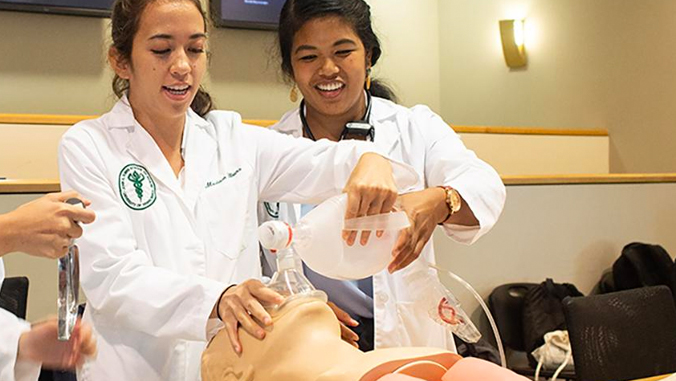
Convinced that an ever-worsening shortage of doctors threatens the state’s welfare, the University of Hawaiʻi Board of Regents has agreed to ask the 2020 Hawaiʻi State Legislature to begin an expansion of the University of Hawaiʻi at Mānoa John A. Burns School of Medicine (JABSOM) to Maui.
Gov. David Ige backs the proposal to create a Maui-based teaching hub that would educate medical students (MDs) and serve as a base for residency program expansion. MDs receiving additional specialty training after graduation from medical school could do part of it on Maui under supervision. Together, those steps are the most effective action that can be taken to increase the ranks of MDs in Hawaiʻi.
“We know that our students who graduate from the University of Hawaiʻi medical school and also train in a UH residency program are 80 percent likely to remain in Hawaiʻi to practice,” said JABSOM Dean Jerris Hedges. “Important life changes happen during medical school and after—people get married and start having a family. If they can do that in residency and here at home they’re just more likely to stay.”
JABSOM already accepts students statewide, but there is a tendency for young people to be drawn into professions where training is visible in their own community, according to second-year medical student Amandalin Rock of Haʻikū.
“Having it on your own island makes it seem attainable,” said Rock, who first attended nursing school at UH Maui College. “Maui is a perfect place (for JABSOM to train MDs and residents). There is a simulation lab—I remember using it. There is a hospital with many areas of the hospital people can rotate through, as we did as nurses.”
Synergy with UH Maui College and a healthcare community that already partners in some ways with JABSOM is one advantage to starting the pilot expansion project on the Valley Isle.
Next steps
The first step is legislative approval of funding to hire faculty.
“The request is $1.4 million dollars, which would fund faculty positions in several different specialties, including PhD-level educators and some key administrative staff,” said Lee Buenconsejo-Lum, JABSOM interim associate dean for academic affairs. “Because of our national accreditation requirements, the educational experiences, including in how we evaluate them must be at the same high level across the islands, and consistent with national standards. Therefore, we must have compensated, highly trained academic educator faculty to fulfill that critical role.”
The possibility of future medical students attending JABSOM full-time for all four years of school excites the Maui medical students now learning on Oʻahu. They believe having JABSOM on Maui will boost educational opportunities on the island overall.
“If your zip code doesn’t start with 968 (the Honolulu zip code) you are already at a disadvantage,” said Madison Williams, a first-year student from Kula. “Not only because of lack of healthcare, but also there are less educational resources.”
“The schools could provide the prerequisites to make it possible to go to medical school if the medical school opportunity was on the island,” added Rock.
JABSOM says once funding is available the initial phase of recruitment could begin in the next academic year. If funding is approved in 2020, the first Maui class could start in July 2021.
Read the full story on the JABSOM website.

